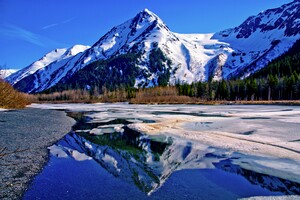They are the result of melting permafrost.

Scientists from NASA stated that the lakes , which appear in Alaska as a result of melting permafrost, release a large amount of methane into the atmosphere. Such lakes, called thermokarsts, are so full of methane that you can see it “boiling” on their surface, Science Alert reports.
More and more such lakes are appearing in Alaska due to melting permafrost, according to associated with global warming and forest fires. When this melting occurs, massive blocks of ice wedged into the ground also melt, causing the ground to collapse several meters.
Read also: Global warming: the main climatic points of no return are close – research
Water and bacteria penetrate the left craters, which emit methane. According to NASA, there are millions of similar lakes in the Arctic, but they are already thousands of years old, so they do not produce much gas. But it is produced by relatively young ones that appeared about 50 years ago and later.
According to some reports, these lakes contain so much methane that they can be set on fire just by holding a match to them.
>
Carbon dioxide is the main threat to the climate in the long term. At the same time, methane leakage has become an acute problem in the fight against climate change – in the short term. Methane is a greenhouse gas, which means it traps the heat that the Earth emits, preventing the planet from cooling. It is about 30 times better than carbon dioxide, traps heat, but also dissipates faster.
Related video
Recall that data from the European Copernicus satellite system showed that the last seven years were the hottest in the history of observations< /strong>. Last year, 2021, became the fifth in the list of the hottest years, in some regions temperature records were registered.
See special topic: Greenland “has lost a lot of weight” » due to melting ice – scientists NASA researchers have found a way to weigh the largest island on Earth. Scientists have found a relatively cheap way to cool the Earth's poles The poles of our planet are heating up much faster than other regions. Global warming can hinder the ability of forests to absorb carbon dioxide Warming prevents tree leaves from cooling. One ocean of the Earth absorbs almost all excess heat on the planet – scientists The consequences of this can be unpredictable. The “Doomsday Glacier” is hanging on “by a thread” – scientists The melting of the glacier can raise the level of the world's oceans by several meters.




